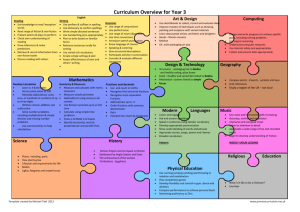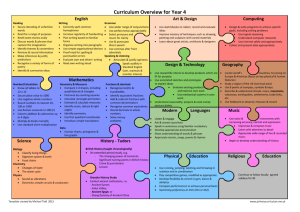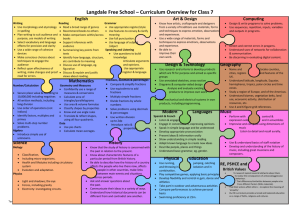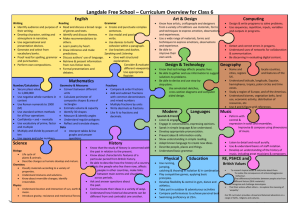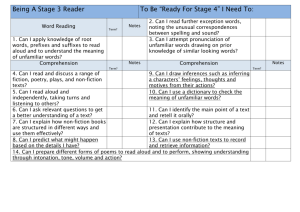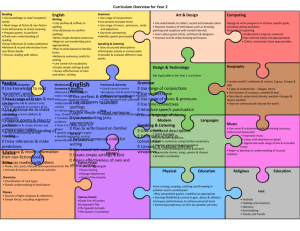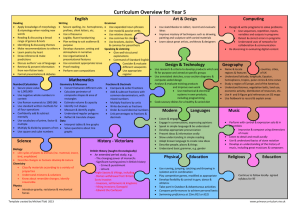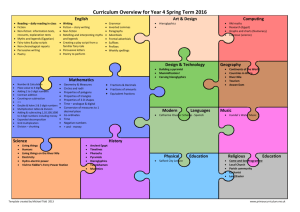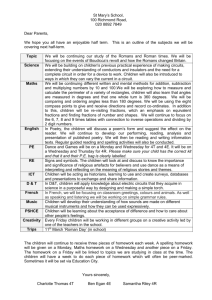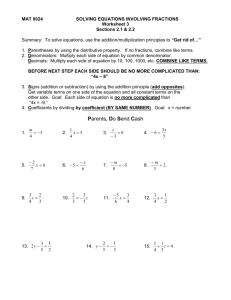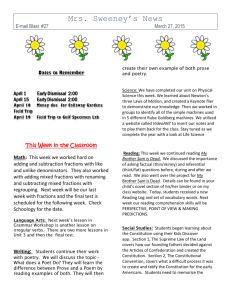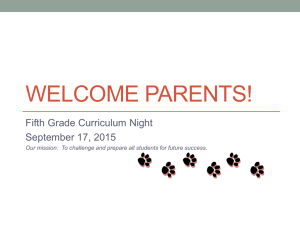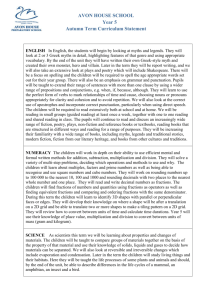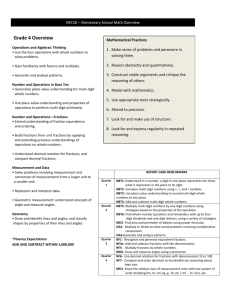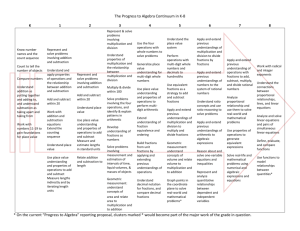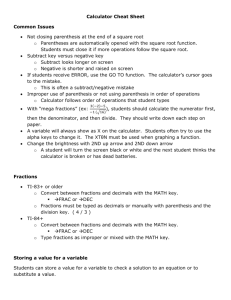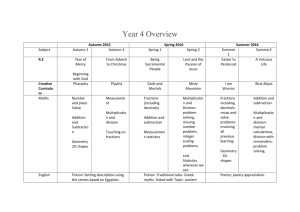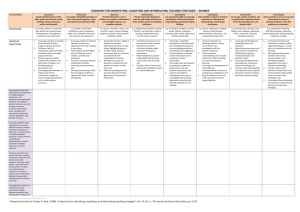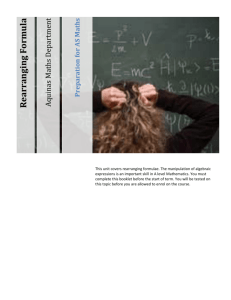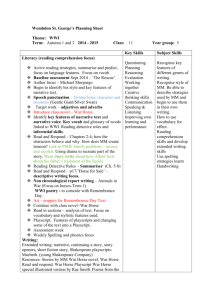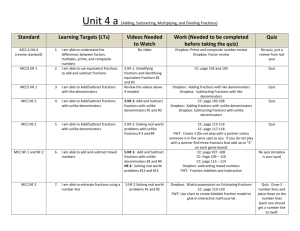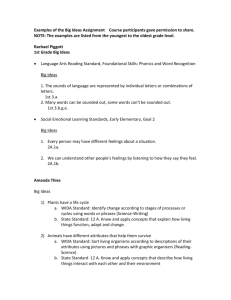Year 3 Curriculum Jigsaw
advertisement
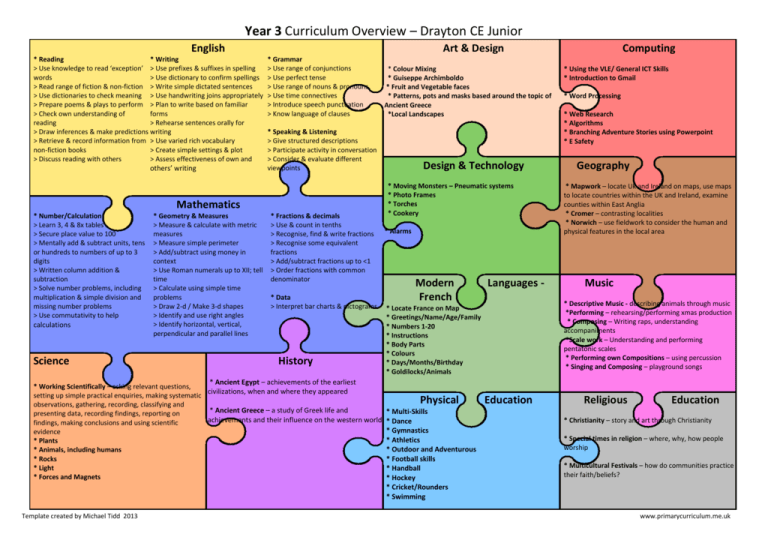
Year 3 Curriculum Overview – Drayton CE Junior English * Reading * Writing > Use knowledge to read ‘exception’ > Use prefixes & suffixes in spelling words > Use dictionary to confirm spellings > Read range of fiction & non-fiction > Write simple dictated sentences > Use dictionaries to check meaning > Use handwriting joins appropriately > Prepare poems & plays to perform > Plan to write based on familiar > Check own understanding of forms reading > Rehearse sentences orally for > Draw inferences & make predictions writing > Retrieve & record information from > Use varied rich vocabulary non-fiction books > Create simple settings & plot > Discuss reading with others > Assess effectiveness of own and others’ writing Art & Design * Grammar > Use range of conjunctions > Use perfect tense > Use range of nouns & pronouns > Use time connectives > Introduce speech punctuation > Know language of clauses * Speaking & Listening > Give structured descriptions > Participate activity in conversation > Consider & evaluate different viewpoints Mathematics * Number/Calculation > Learn 3, 4 & 8x tables > Secure place value to 100 > Mentally add & subtract units, tens or hundreds to numbers of up to 3 digits > Written column addition & subtraction > Solve number problems, including multiplication & simple division and missing number problems > Use commutativity to help calculations Science * Geometry & Measures > Measure & calculate with metric measures > Measure simple perimeter > Add/subtract using money in context > Use Roman numerals up to XII; tell time > Calculate using simple time problems > Draw 2-d / Make 3-d shapes > Identify and use right angles > Identify horizontal, vertical, perpendicular and parallel lines * Fractions & decimals > Use & count in tenths > Recognise, find & write fractions > Recognise some equivalent fractions > Add/subtract fractions up to <1 > Order fractions with common denominator * Data > Interpret bar charts & pictograms History * Ancient Egypt – achievements of the earliest * Working Scientifically – asking relevant questions, civilizations, when and where they appeared setting up simple practical enquiries, making systematic observations, gathering, recording, classifying and * Ancient Greece – a study of Greek life and presenting data, recording findings, reporting on achievements and their influence on the western world findings, making conclusions and using scientific evidence * Plants * Animals, including humans * Rocks * Light * Forces and Magnets Template created by Michael Tidd 2013 * Colour Mixing * Guiseppe Archimboldo * Fruit and Vegetable faces * Patterns, pots and masks based around the topic of Ancient Greece *Local Landscapes Design & Technology * Moving Monsters – Pneumatic systems * Photo Frames * Torches * Cookery * Alarms Modern French Languages - * Multi-Skills * Dance * Gymnastics * Athletics * Outdoor and Adventurous * Football skills * Handball * Hockey * Cricket/Rounders * Swimming * Using the VLE/ General ICT Skills * Introduction to Gmail * Word Processing * Web Research * Algorithms * Branching Adventure Stories using Powerpoint * E Safety Geography * Mapwork – locate Uk and Ireland on maps, use maps to locate countries within the UK and Ireland, examine counties within East Anglia * Cromer – contrasting localities * Norwich – use fieldwork to consider the human and physical features in the local area Music * Descriptive Music - describing animals through music *Performing – rehearsing/performing xmas production * Composing – Writing raps, understanding accompaniments *Scale work – Understanding and performing pentatonic scales * Performing own Compositions – using percussion * Singing and Composing – playground songs * Locate France on Map * Greetings/Name/Age/Family * Numbers 1-20 * Instructions * Body Parts * Colours * Days/Months/Birthday * Goldilocks/Animals Physical Computing Education Religious Education * Christianity – story and art through Christianity * Special times in religion – where, why, how people worship * Multicultural Festivals – how do communities practice their faith/beliefs? www.primarycurriculum.me.uk
